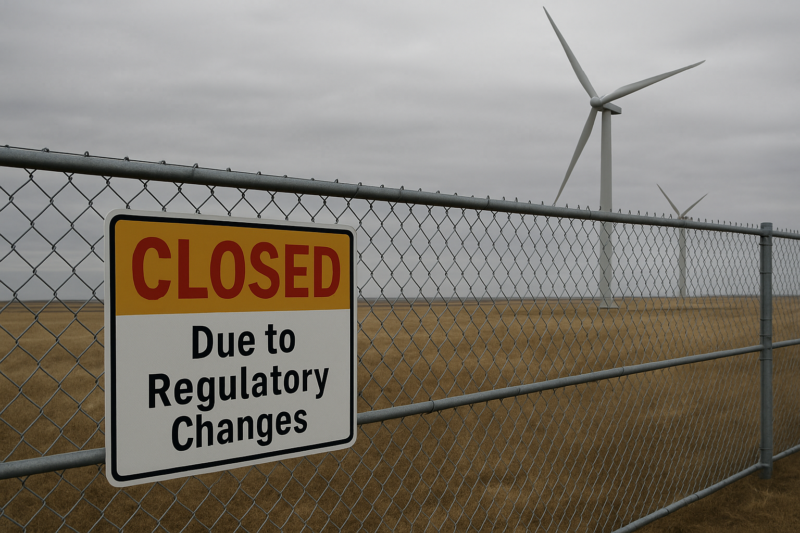Alberta’s latest assault on renewable energy investors is as clear as it is cynical. The provincial government’s newly minted reclamation rules for wind and solar projects, effective as of May 31, 2025, are unprecedentedly severe, requiring project developers to post reclamation securities equal to 30% of total anticipated decommissioning costs at project inception, and ramping this up aggressively to 60% after 15 years.
Shockingly, these rules apply retroactively, extending their punitive reach to existing renewable facilities by 2027. This creates a chilling financial burden on both new entrants and long-established projects that already had business plans based on vastly different regulatory assumptions. The exclusion of salvage value, which typically pays for 40% to 80% of reclamation costs, from these calculations further inflates financial obligations beyond international norms, artificially creating what industry representatives rightly describe as the highest reclamation security requirements for renewable energy projects on the planet.
To understand just how extraordinary and damaging this regulatory move is, consider Alberta’s longstanding and embarrassingly lax reclamation rules for fossil fuel extraction. For decades, the province has allowed oil, gas, and coal industries to accumulate massive environmental liabilities while contributing pennies on the dollar toward cleanup costs. The Alberta Energy Regulator’s own numbers are stark, showing a staggering $60 billion worth of unfunded cleanup obligations for abandoned oil and gas wells, with only about $300 million secured from industry, less than 1% of the total liabilities. Other assessments suggest the real liabilities are closer to a quarter of a billion dollars.
Oil sands mines face a similar imbalance, with over $57 billion in reclamation obligations and a mere fraction of that amount actually secured through the Mine Financial Security Program. These fossil industries have been permitted to operate with minimal upfront financial assurances, allowing them to extract immense profits while shifting cleanup burdens onto future taxpayers and communities.
Alberta’s regulatory record is littered with deferred responsibility and policy double standards, consistently treating oil, gas, and coal with kid gloves, while now subjecting renewables to draconian, punitive, and politically motivated requirements. The renewable energy sector, previously a rare bright spot in Alberta’s economy, is now the victim of a targeted ideological crusade. Industry experts have warned that these new rules introduce unprecedented uncertainty, effectively halting billions in investment and sending companies scrambling to friendlier jurisdictions.
The retroactive application of these harsh standards undermines the very foundation of contractual law, exposing renewable energy investors to arbitrary government intervention long after investments have been made and capital committed. This move is a textbook case of a populist conservative government breaking contractual norms for ideological purposes, a theme highlighted extensively in my recent analysis of similar regulatory interventions in conservative-led jurisdictions like Texas.
This retroactive application of financial obligations is particularly corrosive. Investors and companies rely on regulatory stability as a core component of their risk assessment. Once projects are operating, the assumption is that regulatory environments will remain consistent, especially regarding basic financial obligations such as reclamation costs.
Alberta’s sudden rewriting of these rules, imposing significant retroactive burdens, sends a stark signal to capital markets that Alberta is no longer a predictable or trustworthy partner. This political sabotage directly undermines investor confidence across all sectors, extending beyond renewable energy to erode the province’s broader investment attractiveness. Indeed, it has already begun to drive capital out of Alberta to jurisdictions such as British Columbia and Ontario, where governments provide clearer, more predictable regulatory frameworks. Data centers are retargeting to BC as one clear example.
The fallout is immediate and profound. Renewable project development had already slowed dramatically with the one-year pause on approvals and the absurd rules purportedly protecting agricultural land and scenic views. Corporate renewable energy deals, which previously positioned Alberta as a Canadian leader in wind and solar investment, dried up.
Potential investors, watching closely, rightly see Alberta’s new reclamation policy as a glaring red flag, indicating a government willing to rewrite the rules on a whim, even retroactively. These developments will inevitably hinder the province’s transition toward cleaner energy sources and indeed any new business development, keeping Alberta unnecessarily tethered to fossil fuels while the rest of the world moves aggressively forward.
Landowners and municipalities, whom the government claims to protect with these regulations, are ultimately harmed as well. By imposing excessively punitive requirements, Alberta risks leaving prime renewable energy sites unused or abandoned prematurely. It is rural communities, poised to benefit significantly from renewable development through new employment opportunities, tax revenue, and land-lease payments, who stand to lose most.
The claim that these new regulations protect landowners is profoundly disingenuous. If landowner welfare were genuinely a priority, the province would have first acted decisively to clean up the tens of thousands of orphaned oil and gas wells still littering Alberta’s farmland, many of which leak pollutants directly into rural water tables. Instead, the government during COVID gave all well owners a tax break on municipal taxes, and most firms didn’t bother to start paying again, leaving a massive hole in rural towns’ revenues. Bizarrely, it’s in rural towns that this regressive conservative government is most popular.
Beyond the immediate economic impact, Alberta’s regulatory hypocrisy poses severe environmental and reputational risks. As the global investment community increasingly evaluates jurisdictions on their adherence to environmental, social, and governance (ESG) criteria, even if they don’t call it that anymore due to conservative populist attacks, Alberta is moving stubbornly backward. Investors, pension funds, and large institutional players pay close attention when governments selectively apply regulatory rigor.
Alberta’s decision to punish renewable energy developers, who generally pose far lower long-term environmental risks compared to oil and gas operations, appears reckless at best and deliberately hostile at worst. This further jeopardizes Alberta’s already strained reputation on the global stage, exacerbating investor aversion and potentially locking the province into a prolonged economic and environmental malaise.
Given Alberta’s clear unwillingness to ensure equitable regulatory standards across energy sectors, the federal government should step in decisively. Alberta has repeatedly demonstrated an inability or unwillingness to manage its vast environmental liabilities responsibly. Federal intervention is justified and urgently required. Ottawa should impose uniform federal bonding requirements across all energy projects, ensuring Alberta’s ideological double standard cannot continue unchecked. Such intervention would not only level the playing field for renewable energy but also protect Canadian taxpayers from having to eventually foot the enormous bill for Alberta’s regulatory negligence regarding fossil fuel reclamation.
Alberta’s new reclamation rules for renewables are not merely an aberration; they represent a cynical, politically motivated betrayal of investors, communities, and future generations. By undermining basic principles of contractual stability and environmental responsibility, Alberta’s government has sent a dangerous message to capital markets worldwide. The province risks becoming an investment pariah, economically isolated by its own shortsighted ideological crusade.
Only decisive federal action can correct this imbalance, re-establish regulatory fairness, and restore investor confidence in Alberta’s renewable energy potential. Without it, Alberta’s stubborn regulatory hypocrisy will continue to exact a punishing price on the province’s economy, its environment, and its citizens for years to come.

Sign up for CleanTechnica’s Weekly Substack for Zach and Scott’s in-depth analyses and high level summaries, sign up for our daily newsletter, and follow us on Google News!


Whether you have solar power or not, please complete our latest solar power survey.
Have a tip for CleanTechnica? Want to advertise? Want to suggest a guest for our CleanTech Talk podcast? Contact us here.
Sign up for our daily newsletter for 15 new cleantech stories a day. Or sign up for our weekly one on top stories of the week if daily is too frequent.
CleanTechnica uses affiliate links. See our policy here.
CleanTechnica’s Comment Policy

